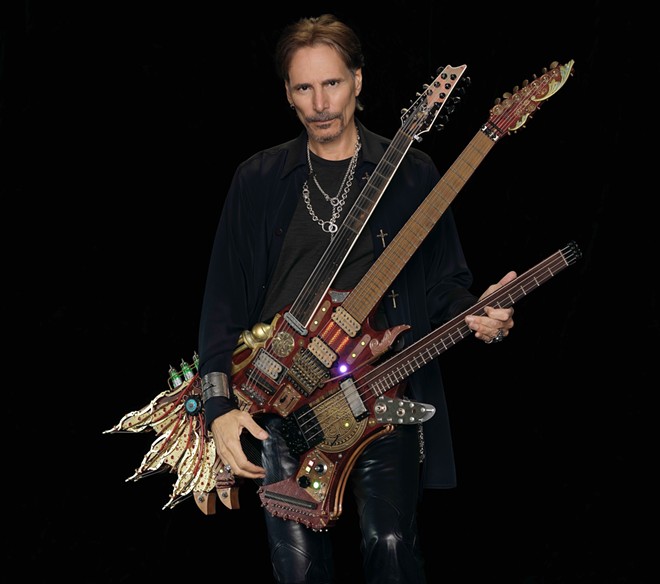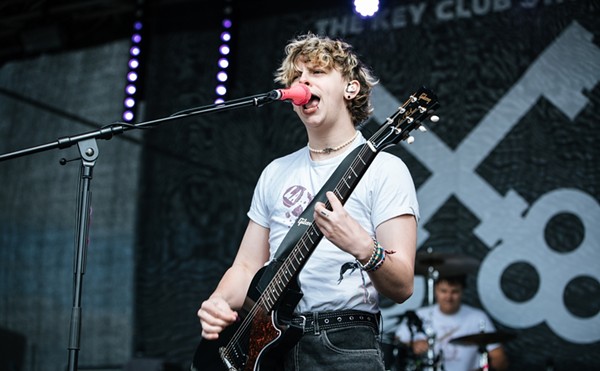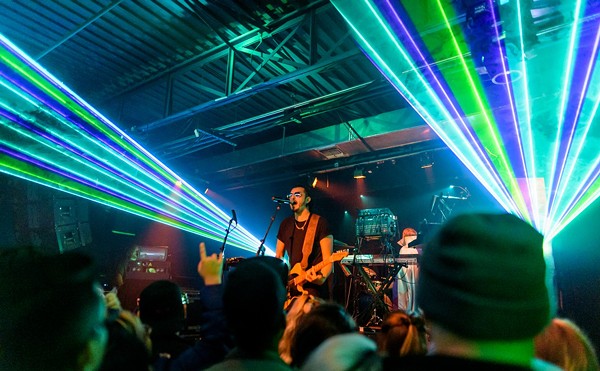Vai scheduled a tour for early this year, including a stop at San Antonio's Aztec Theatre, but was forced to postpone due to a shoulder injury.
Those road dates are now back on, and Vai is set to rock the Aztec on Sunday, Oct. 9.
For fretboard fanatics, Vai needs no introduction. The fleet-fingered musician literally set the bar for six-string virtuosity during a career that's spanned five decades.
The guitarist got his professional start at age 20, joining the backing band of legendary musical iconoclast Frank Zappa. During the '80s hair-metal era, Vai moved into the mainstream thanks to stints with Van Halen singer David Lee Roth and veteran hard rock band Whitesnake.
However, by the early '90s, Vai transitioned into a successful solo career as an instrumentalist. His popular and critically lauded 1991 album Passion & Warfare served as a calling card. He's continued that path to this day, dropping his latest instrumental record, Inviolate, in January.
The Current talked to Vai on Zoom in both the fall of 2021 and the summer of 2022 about his unconventional musical path, his injury and the challenges of wrangling a triple-neck guitar. What follows is a hybrid of those interviews, edited for clarity and length.
We talked last year about a pending San Antonio date, and that tour was postponed due to a shoulder injury. Has that been a chronic thing for you? It's come up before.
Yeah, oddly. I'm very healthy. You go to the doctor, and you fill out those things: "Have you ever had this?" "Do you have low blood sugar?" "Are you taking anything?" It's "No, no, no." I'm in good shape, except my structure has taken a beating. I had a disc taken out of my neck and lower back in my 20s. I grew up hunched over a guitar, you know? My shoulder started three or four years ago, doing a particular type of exercise that started to tear things up. It progressively got worse. Three years ago, I had the first surgery and they fixed three tendons. But then halfway through the healing process, I had an accident and tore another tendon. So, I had to push the tour.
The music industry is coming out of the pandemic slump. Do you feel like the delay in your tour maybe helped a little? That maybe the road is an easier place than it was in early 2022?
When the road is empty for that long, a lot of things can change. It's gonna take a while to catch up. I did a European tour, and for years all the buses had been sitting. They weren't being used. The bus drivers went to drive trucks, where they get paid better and it's easier. Suddenly, all of the bands that haven't toured for two years are on tour. One of the challenges is finding a bus that doesn't keep breaking down. I went through four buses on my last tour. For audiences, it's different. They're like, "should I go?" But I think this is all going to pass. These viruses have been around forever. They do have an effect and they can compromise aspects of your livelihood and your work. But it's part of the evolution of species.
There's this crazy three-neck guitar you designed and are wielding these days, the Hydra. There's even a song from Inviolate, "Teeth of the Hydra," written for the instrument. That must be heavy. Are you physically able to play it live?
I've asked my guys to weigh it, because I get that question a lot. But I haven't gotten that number! (Laughs.) The Hydra is a visual kind of thing. When it's on you, on the waist strap, it feels kind of good. That's the easiest way to play it. But it's so heavy, so unwieldy, that if you start moving, it throws you right off. I had to work to be able to hold it for a period of time. Your legs give out. There's no weight on anything but your waist and legs. The equilibrium of it ... If you lean a certain way, the Hydra thinks you want to go to Chicago! But I have a stand for it, and I'm probably going to take the stand on tour.
It looks like a monster.
It’s an unwieldy beast. I recorded the song in sections. I wanted to write a piece of music that was a decent piece of music on its own, without aiding what looks like it could be a gimmick. And it is a gimmick until you write a piece of music that utilizes it in a powerful way. The first thing I wrote for that was the melody, and I wrote it on paper. I couldn’t bring the Hydra to Europe because of my shoulder. I wasn’t even sure I was going to be able to bring it [on the U.S. tour].
Fans had a little more time to absorb Inviolate due to the tour delay. Does that impact the setlist?
I like to play five or six songs from a new record when I go out. I created the setlist based on the kind of things I’d like to see if I was in the audience. I want to feel there’s an engaging presence onstage, I want to feel part of something, I want to feel the ebb and flow, I want to hear good melody, I want to be fascinated by virtuosity. I get excited when I look down at the setlist and a new song is coming up.
That must be a great feeling. All of us have “punch the clock” aspects to our jobs.
There’s been times when I’ve engaged in things simply for the economics. I’m a working musician. The important thing is I always made sure I felt like I could make an appropriate contribution. Once a Russian oligarch offered me a crazy amount of money to do a solo on his daughter’s record. I’m like "that’s a lot of money." I listened to the record, and I could’ve just ripped [a solo] off. But I just couldn’t, you know?
Putting together a setlist 40 years into your career must be different from when you were just getting started. You've got a lot more ground to cover now than you did when Passion & Warfare dropped in 1990.
Many artists build their set and include the things the audience is expecting. For me, that's "Tender Surrender," "Bad Horsie," "For the Love of God," tracks like that. I'll choose a handful of tracks that I've never played, or maybe played years ago. Then I work the new stuff into it. I try to create an ebb and flow that keeps people engaged. [Too many] piercing guitars can be enough to give anyone an icepick to the forehead.
A fellow legendary guitar slinger, Trey Anastasio of Phish, has made similar comments. For example, Phish doesn’t have an opening act because Anastasio is concerned about ear fatigue.
I don’t see Phish as inducing ear fatigue. There’s nothing unfriendly about their sound or music. It’s nice to listen to if you like that kind of music.
Have you ever heard Phish’s cover of [Zappa’s] "Peaches En Regalia?" Their whole scene is very different from Zappa’s.
Frank was very sober. The only time I ever saw him altered was when he was suffering through cancer and he had to take morphine. But still, he was there. I’ve heard [Phish’s cover of “Peaches En Regalia”], but I don’t know what Frank would think about it. It would be based on the mood he was in when he heard it. I will say he was opposed to drugs, but he didn’t oppose people’s right to take them. I saw an interview recently with him where he said that, so I’m not putting words in his mouth. A day doesn’t go by when I don’t think about Frank.
Your first solo album, Flex-Able, has an unmistakable Zappa influence.
That record was done with a lot of freedom. You can hear the Zappa influences in it, but it's all the things I liked before I heard Frank. Crazy guitar playing, comedy, composition. But then I changed. I was innocent and naïve back then. Those were formative years. That record is so much fun. Like the story of how I titled "There's Something Dead in Here." I wrote it out for eight guitars because I had just gotten an eight-track recorder. At the time, I had a boa constrictor and it got out of its cage and made it into the wall of the studio. It killed something, like a rodent. This rodent was decaying in the wall. The studio smelled like there was something dead in there. And there was!
You’ve said that Zappa excelled at helping people reach their potential.
As a composer, Frank Zappa pulled from any means necessary to make his art. In order to work with Frank, you had to be able to do something that was kind of quietly extraordinary. It had to be natural to you, but then you had to work on it. Frank was able to intuitively recognize what that was. He was able to push people towards their potential by giving them something that was just a little more difficult than what they could do. And then you worked on it, and you got it. He offered the platform and you became a color on his palette. He found my natural interest which was — at the time — very complex melodic lines and polyrhythmic notation. In ways that it probably shouldn’t be!
How did he recognize that in musicians?
He’s Frank Zappa! Frank was the most extraordinary man I ever met. He had the ability to focus without distraction, and you knew this by talking with him. He was talking to you. He had your attention, and you had his.
What an experience to encounter him so young in your life. You were 18 when you started doing transcriptions for him.
I was going to school at Berklee. He heard a tape of me and wanted to try me out for the band but when he found out I was 18, he basically said ‘no, but you can transcribe.’ I transcribed one of his pieces, ‘The Black Page,’ which is a death-defying piece of music. He recognized that I had an ear for that kind of transcribing, so he put me to work transcribing all of these guitar solos with drum parts. Then he hired me to go through his entire catalog and make sure there were lead sheets or scores for everything. A lot of stuff was missing. I moved out to California when I was 20 and joined the band.
You also spent time in David Lee Roth's solo band in the '80s. At the time Roth's second solo album, Skyscraper, came out, I recall you expressing disappointment in the record. Bassist Billy Sheehan left the band before the tour. How has that record aged?
Our perceptions of our past work changes through time, and my perspective of that record has changed. It was challenging. We were going to hire [longtime Van Halen producer] Ted Templeman to come in and produce the record, but we were having such a good time doing demos that Dave decided to produce it himself. Dave had done live-in-the-studio [recordings] his whole career, and he was interested in doing more dimensional things. You can hear that on Skyscraper. I had a lot to do with that too, because that's the world I was coming from. Some of the songs I was maybe not so crazy about at the time. That record was an opportunity for me to make transitions. I couldn't have produced [Roth's debut long-player] Eat 'Em and Smile and have it come out that way. I'm like this forensic guy, but Ted Templeman is like, "Just get in there and play."
You sat in with Whitesnake at Hellfest in June of this year, and you were a member of the band in the late '80s and early '90s. What was it like being reuniting with David Coverdale after all these years?
It was great. It’s been a while since I’ve been on stage with a qualified frontman like that. It felt good to hear his voice and feel the energy of that big arena scene. David and I remain friends and text each other all the time.
Also, earlier this year you sat in with Living Colour in South America.
[Guitarist] Vernon Reid is a gem. That whole band, really. I worked with them on the Experience Hendrix Tour. They’ve really got it together.
When those sit-ins happen, are they rehearsed in advance, or do you just jump in?
For Whitesnake, I just jumped in. With Living Colour, it was five songs. You don’t want to wing something like that. You listen to it and say, "Is this the way you guys are doing it?" They say, "No, we changed it." Then it’s, "OK, I’m coming to rehearsal."
Speaking of ‘80s acts, the Mötley Crüe, Def Leppard, Poison, Joan Jett stadium tour was one of the biggest of 2022. Poison opened here in San Antonio when you played here with David Lee Roth back on the Skyscraper tour. Do you think that era has been unfairly maligned, and that maybe now it’s being embraced as classic rock?
There’s always a changing of the guards, an evolution. You see that in pop music or guitar playing. When things change, it’s almost as if the previous genre becomes the devil. You can’t talk about it. Then you get Nirvana or something like this. Bands that have a personal stake in the music. Then that music becomes popular, and — all of a sudden — you have people that may not be that uniquely inspired jump on that because they like it, it moves them, it’s what’s popular. They start writing this music, and next think you know, it’s insipid. Then someone comes along and shakes it all up. I can relate it as far as '80s shred-guitar playing. Then grunge or whatever came in, and to be able to play guitar was a no-no. But time has a way of dissolving those myths, and you see the genre for those things that it had in it that were exciting.
If you had to choose a non-solo LP from your career that would be preserved and the rest go to the dustbin of history, what would you choose?
That’s a tough one. Based on just pure display of musicality, there’s a Frank Zappa record. I think it’s You Can’t Do That on Stage Anymore, Volume 6. On it is a lot of the very complex things that I play. Beautiful melodies. As far as the pantheons of rock 'n' roll, I’d say [Roth’s] Eat ‘Em and Smile. It’s a very raw, fun record. But I love the Public Image Ltd. record, [Album], that I did too. Some of my best playing, because I wasn’t in control of anything but my notes. That was nice.
What contemporary artists do you enjoy?
My wife likes pop music, so we get into things like Harry Styles. I like his record. A band that I didn't think I would like because I saw a picture and made a mental judgment, is the band Ghost. [Vocalist and bandleader] Tobias [Forge] is a pure genius. Some of it is funny to me, in a way. But it's totally inspired and done so well. And there's theater in it. And a mystique. And melody.
What's the biggest misconception about you and your music?
"Steve Vai is a shredder that plays notes with no heart and no feel." That's true. To that person. There are no misconceptions. Whatever you believe about something is true to you.
$35-$49.50, 8 p.m. Sunday, Oct. 9, 8 p.m., Aztec Theatre, 104 N. St. Mary's St., (210) 812-4355, theaztectheatre.com.
Stay on top of San Antonio news and views. Sign up for our Weekly Headlines Newsletter.


















